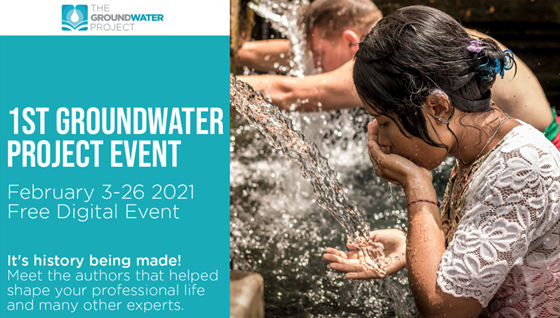With the objective of bringing together the largest global groundwater community in the world, the Groundwater Project will hold a series of free meetings and debates between the 3rd and 26th of February 2021 with the greatest references in hydrogeology in the world. The themes of the talks are diverse and very interesting for everyone who knows or wants to know more about groundwater!
Groundwater and intensive use and Groundwater for All are two themes discussed at the event and which have significant relevance for current and future generations, since we need water (groundwater) for the entire population, and intensive use can compromise supply.
In this sense, population growth and associated industrialization continue to contribute to water supply problems worldwide, and hence efficient groundwater management will be a challenge for the foreseeable future. According to Lundqvist et al. (2003) and Srinivasan et al. (2013), increasing urban population density will lead to additional demands for drinking water, and will result in the generation of treated and untreated wastewater being discharged into the environment. High quality water is a basic requirement for economic development, and effective and innovative ways to manage water use and storage are needed to face the increasing pressure. Sousa et al. (2014) state that this pressure will not only be due to the rising demand for freshwater, but also due to the decline in water quality as a result of human activities and natural phenomena.

The potential global water crisis is related to precarious management and governance rather than to the availability of resources, and a sustainable world consumption standard is still far from being achieved (Jacobi & Grandisoli, 2017). According to the United Nations Educational, Scientific and Cultural Organization (UNESCO; 2015), the world will face a water supply deficit of about 40 % by 2030 assuming the current consumption rate remains unchanged. Therefore, water management based on scientific and technical knowledge that considers both surface water and groundwater is crucial.
Groundwater is particularly essential for human consumption and, according to the United Nations World Water Assessment Programme – WWAP (2009), it is the source of approximately half of all drinking water worldwide. An aquifer can store a large volume of water and thus allows for exploitation during long periods of low recharge (WWAP, 2012), but for this to be sustainable, efficient water management is required. Aquifers are the most reliable water reservoirs, and their management is essential to ensure that water that is extracted is restored to preserve this resource for use by future generations. In some cases, natural recharge rates are insufficient to replenish an aquifer with the current water use, which implies that artificial recharge is needed to ensure a sustainable water balance. Since water degradation is related to water scarcity, it needs to be objectively assessed for timely management decisions to be made.

There is a clear need for good groundwater management, sustainable and non-intensive use for groundwater for all, the speakers Dinesh Singhal (President, IAH Indian National Chapter), Manuel Sapiano (CEO at the Energy and Water Agency in Malta) (to be confirmed), Ryan Hreljac (Founder & Executive Director of the Ryan’s Well Foundation), Enock Obwon (Hydrogeologist from Uganda – Africa) and Roberto Kirchheim (Research Company of Mineral Resources – Geological Service – Brazil) are excellent professionals who will further discuss these issues at the event. Don’t miss it and subscribe: https://events.gw-project.org/2021
References:
Jacobi, P. R., and Grandisoli, E.: Água e Sustentabilidade: desafios, perspectivas e soluções. São Paulo, SP: IEE/USP, 1st ed., 1, 112 pp., 2017.
Lundquist, J.D., Cayan, D.R., and Dettinger, M.D.: Meteorology and hydrology in Yosemite National Park: A sensor network application, in: Zhao, F., and Guibas, L.: Information Processing in Sensor Networks: IPSN, LNCS, 518-528, 2003.
Sousa, M. R., Rudolph, D. L., and Frind, E. O.: Threats to groundwater resources in urbanizing watersheds: The Waterloo Moraine and beyond. Canadian Water Resources Journal/Revue canadienne des ressources hydriques, 39(2), 193-208, 2014.
Srinivasan V., Thomas B. K., Jamwal P., and Lele S.: Climate vulnerability and adaptation of water provisioning in developing countries: approaches to disciplinary and research-practice integration. Current Opinion in Environmental Sustainability, 5(3), 378-383, 2013.
United Nations Educational, Scientific and Cultural Organization: World Water Development Report: Water for a sustainable world, 122 pp., 2015.
World Water Assessment Programme – WWAP: The United Nations World Water Development Report 3: Water in a Changing World. Paris: UNESCO, and London: Earthscan, 76 pp., 2009.
World Water Assessment Programme – WWAP: The United Nations World Water Development Report 2012: Managing Water Report under Uncertainty and Risk. Paris: UNESCO, and London: Earthscan, 866pp., 2012.

